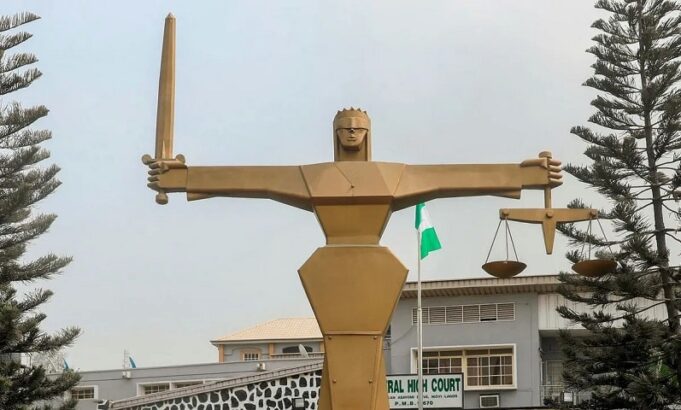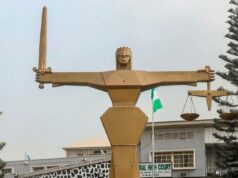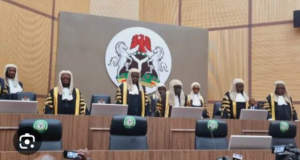The Court of Appeal in Abuja has halted further proceedings regarding the legal battle over the reinstatement of Muhammadu Sanusi II as the 16th Emir of Kano.
The appellate court ruled that all parties should maintain the status quo until their appeals are heard at the Supreme Court.
A three-member panel, led by Justice Biobele Abraham Georgewill, acknowledged that the Kano State Government had withdrawn its application after transmitting the case records to the Supreme Court.
During the hearing, Kano State Government’s counsel, Ibrahim Wangida, informed the court that an appeal had already been filed at the Supreme Court against the March 14 ruling that granted a stay of execution on Sanusi’s reinstatement.
According to him, this transmission effectively put any further actions on hold.
Justice Okon Abang had previously issued an order on March 14 to stay the execution of an earlier judgment that upheld Sanusi’s reinstatement.
Dissatisfied with the ruling, the Kano State Government argued that it was a misinterpretation of constitutional provisions since an appeal had already been lodged at the Supreme Court.
The dispute over Kano’s emirship began when the Kano State Government reinstated Sanusi as Emir following the repeal of the Kano State Emirate Council Law of 2024.
This repeal effectively removed Aminu Ado Bayero as the 15th Emir, along with four other first-class emirs appointed by the former governor, Abdullahi Umar Ganduje.
Despite his removal, Bayero returned to Kano with heavy security presence and occupied the Nasarawa mini palace, challenging his dethronement.
The ongoing crisis has raised concerns about peace and security in the state, especially with both Sanusi and Bayero preparing to host the annual Hawan Daushe festival, a traditional horse-riding ceremony marking the end of Ramadan.
The Kano State Police Command has assured residents of adequate security measures to maintain peace.
However, tensions remain high, with many residents fearing that parallel celebrations by the two rival emirs could lead to unrest.
In the midst of the legal battle, Sanusi recently inaugurated a new district head in Bichi, replacing Nasir Ado Bayero, the younger brother of Aminu Ado Bayero.
This move is seen as a significant step in consolidating Sanusi’s position.
During the ceremony, the newly appointed Wamban Kano and District Head of Bichi, Alhaji Munir Sanusi Bayero, expressed gratitude for his appointment and emphasized his commitment to education, unity, and the legacy of the Kano Emirate.
Meanwhile, the Kano State Commissioner for Information, Abdullahi Ibrahim Waiye, confirmed that preparations for the Sallah Durbar festival are in full swing across the state’s four emirates.
Emir Sanusi is expected to lead the festival in Kano, while other emirates—Rano, Gaya, and Karaye—will hold separate celebrations.
Reacting to reports that Bayero also plans to stage a separate Durbar, Waiye denied any knowledge of such an event and urged the Federal Government not to interfere in Kano’s affairs.
Emir Sanusi, speaking at a Ramadan Iftar gathering, warned that those plotting to cause violence in Kano would face serious consequences.
He described his opponents as working against divine will and urged residents to remain patient and trust in justice.
In a separate development, the Court of Appeal has scheduled April 8 for the hearing of cases related to the conduct of elections in Kano’s 44 Local Government Areas.
The Kano State House of Assembly is challenging an earlier ruling by the Federal High Court that halted local government elections.
The House of Assembly, represented by senior lawyer Adegboyega Awomolo (SAN), argued that the Federal High Court lacked jurisdiction over the case and that the plaintiffs—Aminu Tiga and the All Progressives Congress (APC)—had no legal standing to file the suit.
In October 2024, Justice Simon Amobeda of the Federal High Court in Kano had barred the state from conducting local government elections, citing violations of constitutional provisions.
The court ruled that members of the Kano State Independent Electoral Commission were card-carrying members of the ruling New Nigeria People’s Party (NNPP), making their role in the elections unconstitutional.
Justice Amobeda also ordered the Independent National Electoral Commission (INEC) not to release the voter register for the elections and barred security agencies from providing any support for the polls.
Dissatisfied with the ruling, the Kano State House of Assembly has asked the Court of Appeal to overturn the decision, arguing that local government elections fall under state jurisdiction and should be adjudicated by the Kano State High Court rather than a federal court.
















